Navigation
Getting your first period is a significant milestone, and it's completely normal to feel a mix of emotions, ranging from fear and nervousness to excitement. Rest assured; it's a beautiful and natural occurrence that signifies your reproductive health.
In this guide, we will explore everything you need to know about your first period – what to expect and how to manage it comfortably. Remember, you are not alone in this experience, and we're here to provide you with accurate information, support, and guidance as you embark on this exciting and transformative phase of your life.
A period, also known as menstruation, is when your body gets rid of the lining of your uterus, often called the 'womb.' The uterus is located in the lower abdomen and is like a home for a potential baby to grow.
During your period, blood and tissue from the uterus come out of your body through the vagina. The menstrual blood and tissue flow out through a small opening called the cervix, which connects the uterus to the vagina.
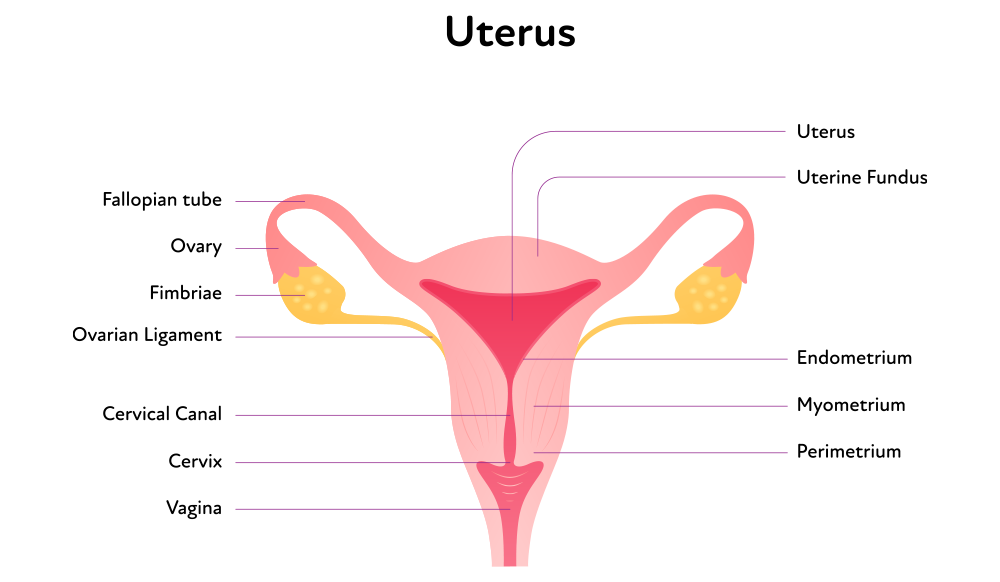
Your first period marks the start of your menstrual cycle. The menstrual cycle is a series of changes in a woman's body every month to prepare for the possibility of having a baby.
During the menstrual cycle, the ovaries (two small, oval-shaped organs in the lower abdomen on either side of the uterus) release estrogen and progesterone hormones. These hormones cause the lining of the uterus to build up, allowing it to implant an egg fertilized by sperm after sexual intercourse.
If an egg is not fertilized by sperm, these hormones drop significantly, and the uterus lining breaks down and bleeds. Then the process, or cycle, begins all over again. It takes about a month for the uterus to build up and shed, which is why most women get their periods every 28 to 32 days.
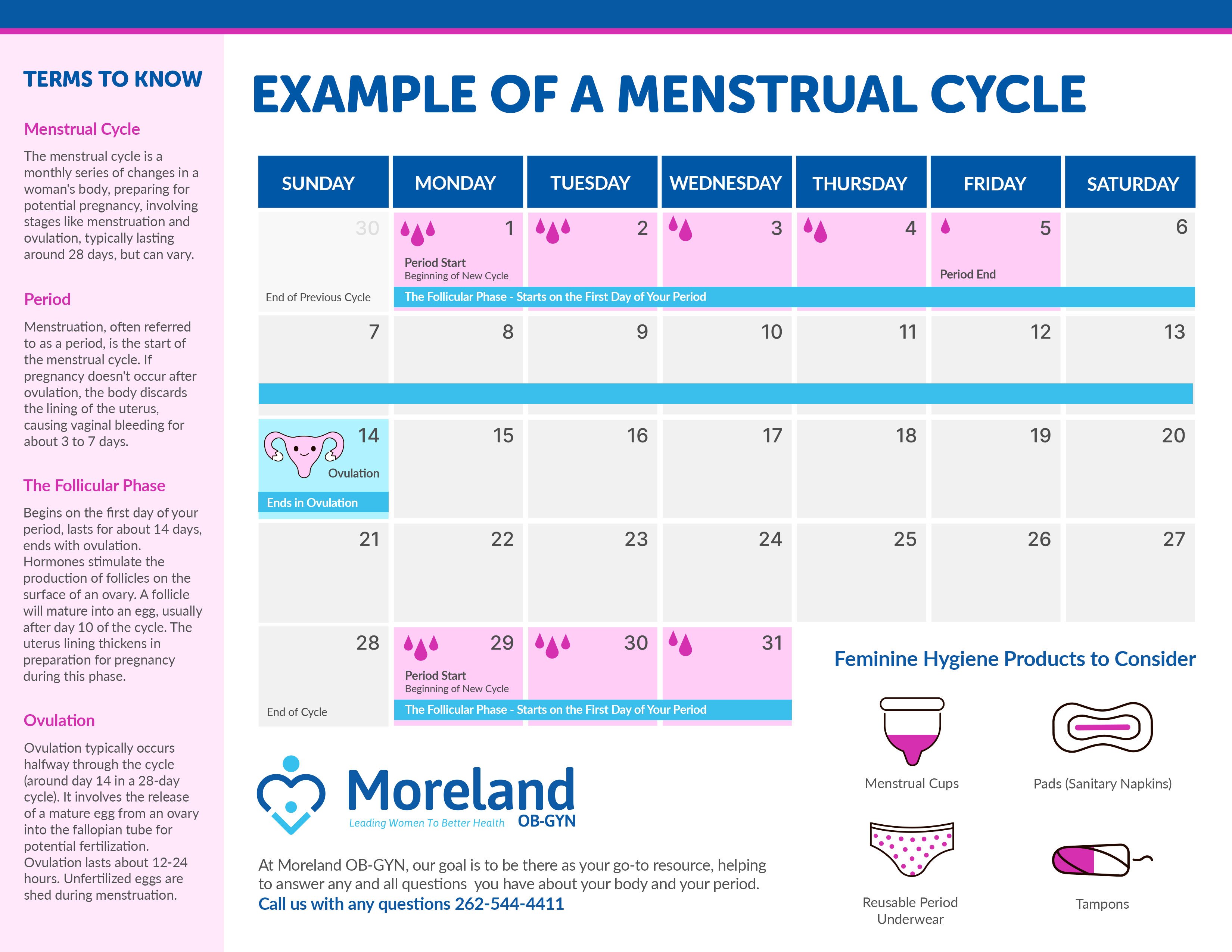
Ovulation occurs about 14 days before the start of your next period. Ovulation is when the body releases an egg from the ovaries. This egg travels through a small tube called the fallopian tube to the uterus. If the egg meets a sperm and they join, it can lead to a baby (pregnancy). During pregnancy, you don't have your regular monthly period. But if sperm doesn’t fertilize the egg, the uterus lining breaks down, and a new cycle begins, which means you'll have your period again.
Yes, a girl can get pregnant as soon as her first period starts. In fact, it may even be possible for a girl to get pregnant right before her first period. Pregnancy before a first period is possible because the hormones that cause ovulation may already be active, preparing the uterine wall for pregnancy.
Have questions about your period, sexual intercourse, and pregnancy? Talking to a loved one about scheduling an appointment with a trusted gynecologist is a great place to start.
At Moreland OB-GYN, our team of caring providers is here to answer all your questions in a warm and caring environment. Learn more about what to expect during your first gynecologist appointment here.
Around 98% of girls usually get their first period between the ages of 9 and 15. But remember, everyone is different, so it's okay if you start earlier or later than that. It's important to know that everyone's body is unique, and your body will follow its own schedule.
A few signs to watch for may tell you your body is preparing for your first period. These include breast development, the growth of pubic hair, physical body changes like wider hips, and an increase in vaginal discharge. These changes typically start about two years before your first period.
Everyone has their own experience with their first period. It might be lighter than future periods with a few spots of red or brown blood, or it could start suddenly with bright red blood and a heavy flow. As your body adjusts to these changes, the amount of blood can vary from month to month, and so can the color, ranging from bright red to dark brown.
Getting your first period in public, like at school, on summer vacation with your friend's family, or even at the grocery store, can be a little scary. It's completely normal to feel nervous about this, as it's a new experience. However, being prepared can help calm your nerves and give you peace of mind.
One way to be prepared is to carry a small bag with essential supplies. You can keep a discreet pouch or bag in your backpack or purse that contains pads or tampons and a change of underwear. This way, if your period starts unexpectedly, you'll have everything you need to handle it confidently. Knowing that you have these supplies ready can help you feel more at ease and in control, even if your first period catches you by surprise.
Keep reading to learn about the different types of feminine hygiene products, what a normal period typically looks like, and common signs and symptoms!
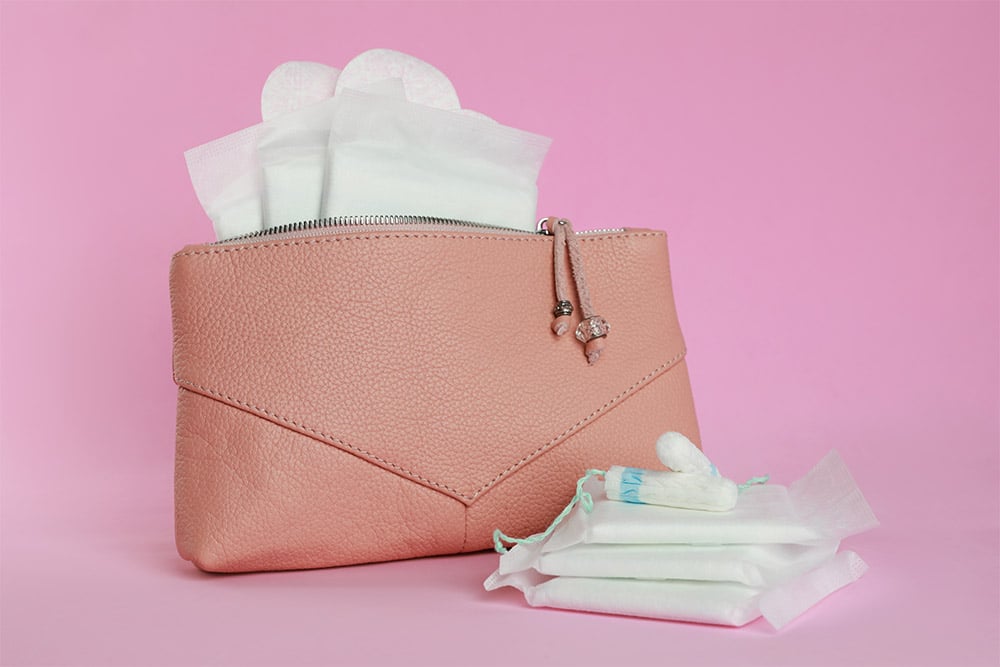
There's a wide variety of feminine hygiene products on the market. Understanding how each product works and trying them out for yourself can help you choose what feels most comfortable.
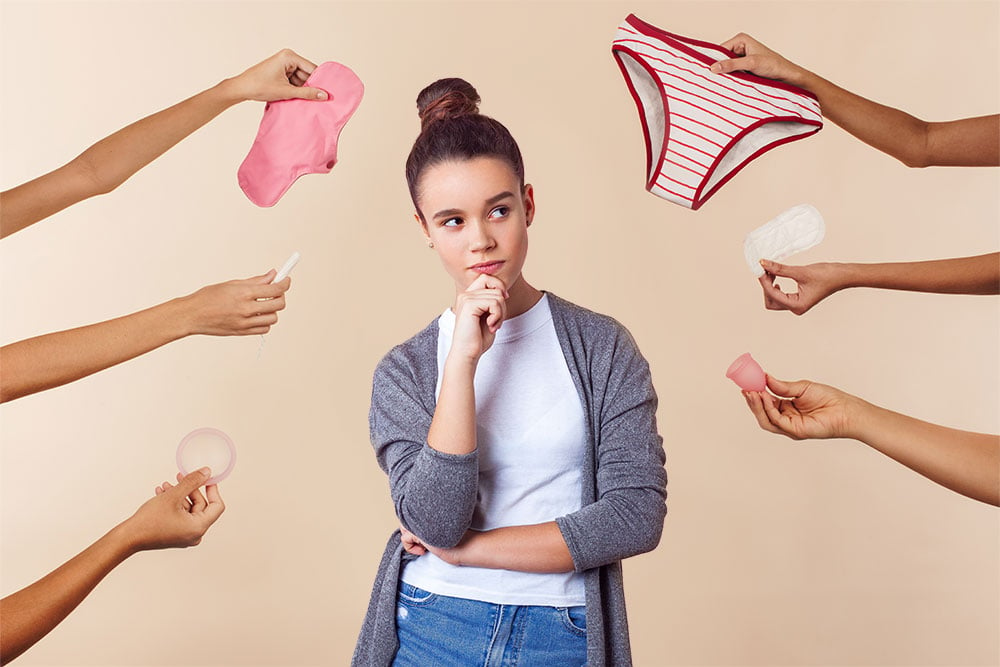
Most girls use one or more of these feminine hygiene products:
A typical period usually lasts between 3 to 7 days, and the average menstrual cycle happens every 21 to 35 days. The flow might be heavier for the first couple of days and then get lighter, but it can differ for each person. Some girls have lighter periods, while others may have heavier periods. Although, on average, you can expect to lose about 4 to 12 teaspoons (20 to 60 milliliters) of blood during your entire period.
Over time, your periods and menstrual cycle might become more regular or somewhat irregular. They can be light or heavy, painful or pain-free, long or short. Remember that everyone’s experience is unique, and as you become more familiar with your body, you'll start to notice what is considered a normal period for you.
It’s also not uncommon to pass small blood clots, a mixture of blood cells and tissue, from the lining of your uterus. While this may be alarming when you first experience it, it’s nothing to be concerned about and is completely normal.
Learn about our adolescent gynecology services here.
Your hormone levels will go up and down throughout your menstrual cycle, and you may experience physical and emotional changes as your period approaches each month. These changes are known as premenstrual syndrome (PMS).
Symptoms of PMS usually occur in the days leading up to the start of your period. While they can be uncomfortable, there are various ways to manage them, such as over-the-counter medications, heating packs, and regular exercise.
Here are some common symptoms and body changes associated with PMS:
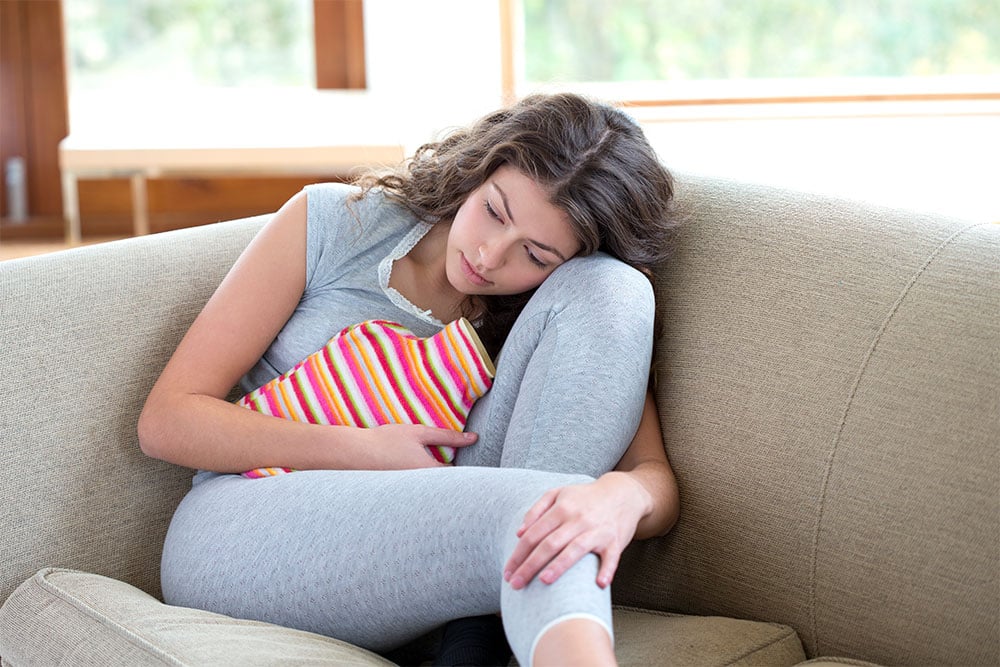
Experiencing PMS symptoms is entirely normal and a part of being a woman. Although, if these symptoms are so extreme they impact your life, such as debilitating pain and sadness, please talk to a loved one or your trusted doctor.
Dealing with PMS symptoms can be challenging, but there are several ways you can manage these symptoms so you don’t have to miss a beat:
Did you know stretching and yoga are great ways to ease painful menstrual cramps? Take a look at our blog to learn 5 key yoga poses you can try to kick menstrual cramps to the curb!
Tracking your period is a helpful way to understand your body and prepare for your menstrual cycle. It can help you predict when your period will start, identify any irregularities, and get to know your unique cycle better.
![]()
To start tracking your period, you can use a calendar, a period-tracking app on your phone, or even a special period-tracker journal. You can choose which specific details to include in your tracker based on what you find most helpful and informative.
Below are some ideas to get you started!
Remember, it's normal for periods to be irregular when you first start menstruating. Your cycle might take a few months or even a couple of years to become more regular. However, if you notice significant changes or irregularities, such as missing periods for several months or having very heavy or painful periods that are debilitating, it's a good idea to talk to a trusted adult or healthcare provider for guidance.
Don’t let your period keep you from having summer fun. Dive into our blog post to learn more about swimming with your period (yes, it’s possible)!
When it comes to your menstrual health, knowledge is power. Taking the time to learn about certain conditions and lifestyle changes that can affect your period is a great way to identify if something is wrong if you notice changes that are not normal to you.
These conditions and lifestyle changes include:
Learn everything you need to know about menstrual cycle problems here!
Below are some best care practices to keep your vagina and its surrounding skin (vulva) happy during your period:
Talk to a loved one or doctor if you notice a strong fishy or rotten odor. No need to be alarmed, but this could mean you have a vaginal infection that needs to be treated.
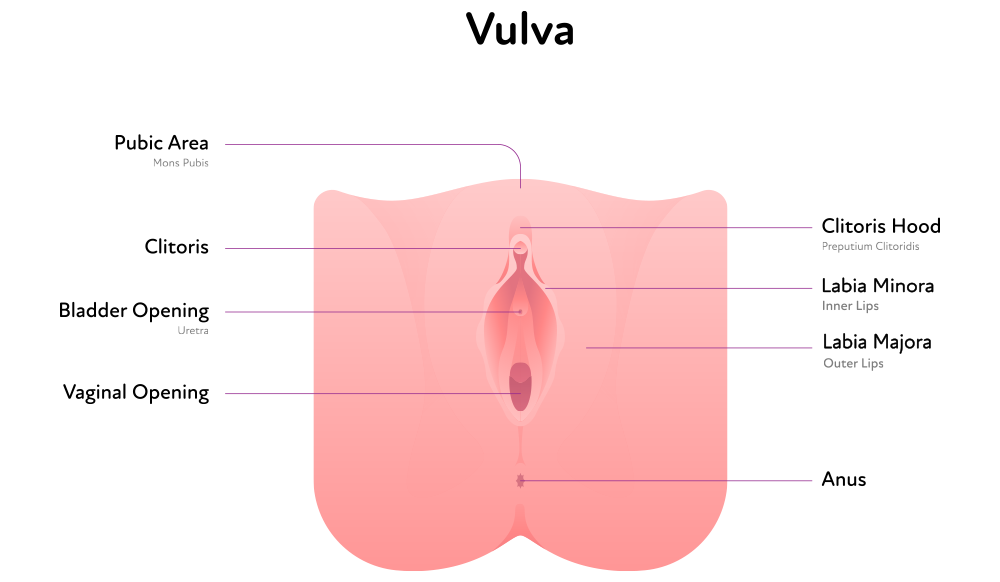
Want to learn more about your vagina and vulva and get more tips on best care practices? Click here!
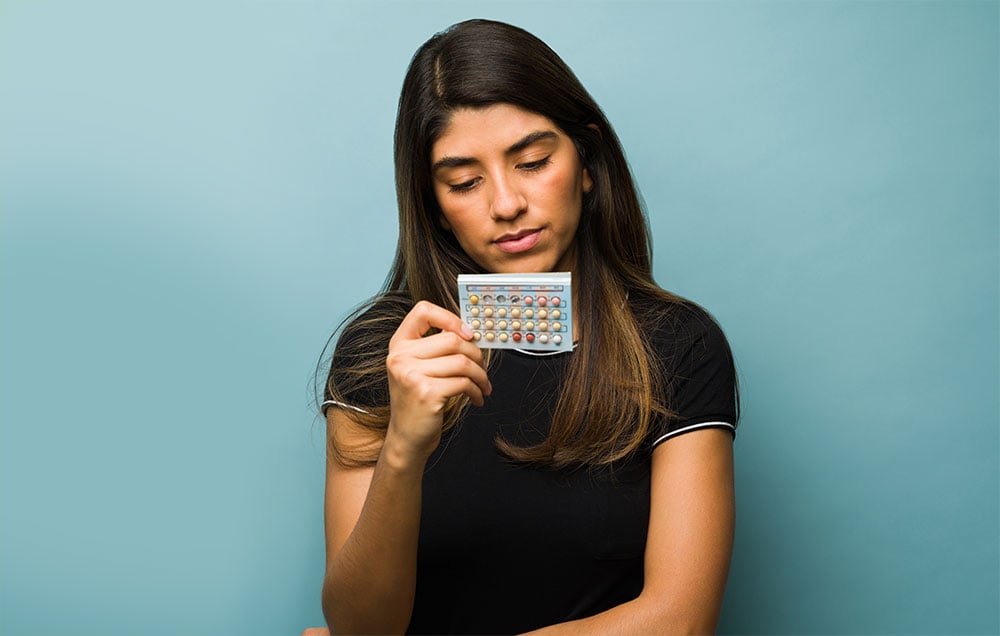
It’s important to remember that getting your first period means you are now at the age where you can get pregnant, and it’s a good time to start educating yourself on sexual health and birth control options.
There are many non-hormonal and hormonal birth control options. Talking with someone you trust or your healthcare provider if you are considering having sexual intercourse is a great way to learn about pregnancy prevention and choose the best birth control option for your body and lifestyle.
Birth control can help prevent pregnancy, and hormonal birth control, such as the hormonal pill, can also help manage conditions associated with irregular periods, such as polycystic ovary syndrome (PCOS) and endometriosis. These hormonal methods regulate hormone levels in the body, which control the timing and flow of periods and help ease debilitating PMS symptoms like painful cramping and extreme mood swings.
Have birth control questions? We have the answers. Read our complete birth control guide for a comprehensive overview of non-hormonal and hormonal birth control options.
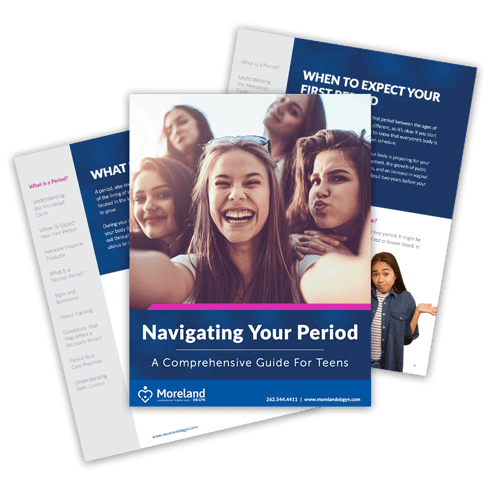
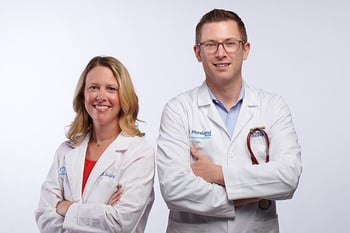 Your period is a natural and beautiful part of life, and it shouldn't hold you back and hinder your ability to exercise, have fun, and enjoy life to the fullest. While it may be a little scary at first, it won’t take long until you adjust to getting your periods every month. You’ll become a pro on your body and period in no time!
Your period is a natural and beautiful part of life, and it shouldn't hold you back and hinder your ability to exercise, have fun, and enjoy life to the fullest. While it may be a little scary at first, it won’t take long until you adjust to getting your periods every month. You’ll become a pro on your body and period in no time!
A woman’s first OB-GYN appointment is at age 18. Your pediatrician can answer any concerns about your period leading up to this age. Although, you may be referred to a gynecologist at an earlier age for further evaluation.
When the time comes for your first gynecologist appointment, the team of caring providers at Moreland OB-GYN will always welcome you with a smile and are happy to help you navigate your journey into womanhood. We are proud to offer adolescent gynecological services and are here to help comfort teen patients and address any questions or concerns they may have about their health.
Have questions or concerns about your body and periods? Talk to someone you trust about scheduling your first appointment with a trusted OBGYN today!
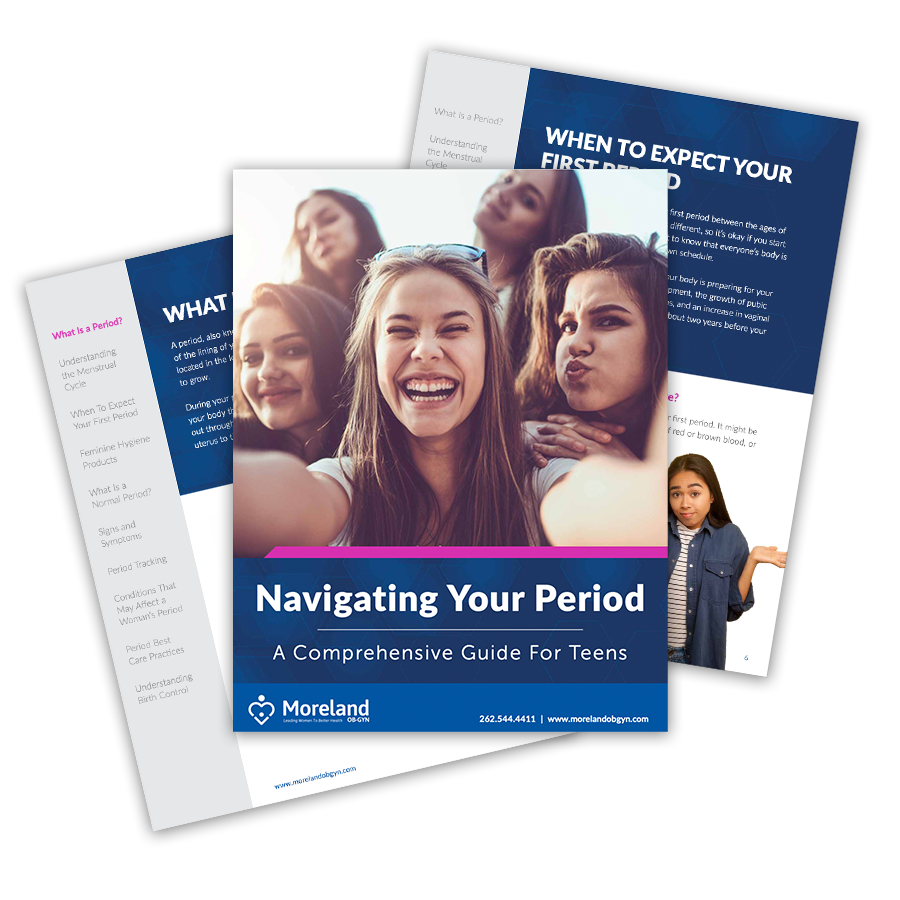
Phone: 262-544-4411
Fax: 262-650-3856
Monday-Thursday:
7:30 am – 6:00 pm
Friday:
7:30 am – 4:00 pm



